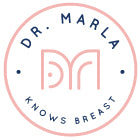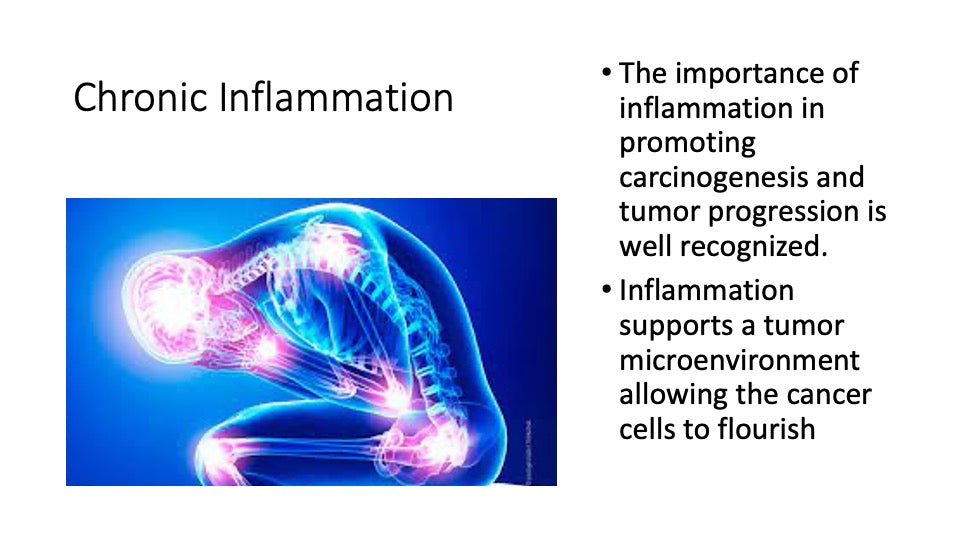Inflammation and Cancer

Bulletpoints
- Acute inflammation is a healing response to injury or pathogenic invaders
- It is chronic inflammation that increases cancer and disease risk
- Chronic inflammation directly supports tumor growth and is a Hallmark of cancer

Inflammation and Cancer
Inflammation is one of the biggest hallmarks of cancer. In fact, inflammation plays a role in nearly every chronic illness.
What is Inflammation?
Inflammation is a broad term that describes any time your body has an immune response to an irritant. Many different types of irritants can cause inflammation, including pathogens, injuries, or toxins.
Inflammation can occur in any area of the body and can manifest itself in many ways. There are five common signs of inflammation, which may occur in any combination: redness, heat, swelling, pain, and loss of function.
While acute inflammation is accompanied by these signs, some inflammation that occurs slowly over time can happen at low intensity in the background. This is the type of inflammation that’s so prevalent in chronic illnesses.
“Chronic inflammation is sometimes called 'smoldering inflammation' because it's inflammation that never really resolves. It's the opposite of 'good' inflammation, which your body uses to get rid of bacteria and viruses, and then, once it achieves its goal, resolves"
Unregulated inflammation can also cause a lot of problems. For example, rheumatoid arthritis is a condition that is caused by the immune system spontaneously attacking otherwise healthy joints. In fact, any disease that ends in “itis” is an inflammatory illness – from bronchitis to dermatitis.
Inflammation Promotes the Tumor Microenvironment

One of the other important hallmarks of cancer is a suitable tumor microenvironment. This refers to the cocktail of compounds and cells that help cancer cells reproduce uncontrollably to form tumors.
When our bodies have an acute inflammatory response to acute injury, the white blood cells of our immune system diligently move quickly to fight the unwanted invaders or heal and repair damaged tissue. An array of inflammatory chemicals and growth factors are released to allow healing. This process is obviously limited to the acute event and eventual repair of tissues takes place or invaders conquered.
However, our modern lives and lifestyle choices can lead to a chronic inflammatory state. A chronic inflammatory state is a Hallmark that promotes a favorable environment for cancer growth. The cancer cells, with the persistent inflammatory state, are able to hijack the immune white blood cells. In turn, the white blood cells are then coersced to continue to release these chemical and growth factors which support new blood vessel formation and allow blood and nutrients to the cancer to support growth.
And since cancer can then trigger more inflammation, it can evolve into a vicious cycle of inflammation and cancer.
Inflammation also Contributes to DNA Damage
One of the other hallmarks of cancer is genomic instability. The genome is the sum of all of the DNA in a cell. The cells in your body take different shapes and forms by expressing different genes within that genome, but the sum total is the same in all cells. Damage to DNA can lead to genomic instability over time, which can lead to cancer.
Another factor is the speed of cell replication. Cancer occurs when cells reproduce rapidly. And DNA damage occurs more quickly with excessive cell proliferation as well. This is because your DNA is always slightly damaged after a replication, so more replications let this damage accumulate faster.
According to Dr. Brad Mons from Cancer Treatment Centers of America, “Anything that causes inflammation will cause the DNA of a cell to replicate faster. The more your cells replicate, the higher chance you have of cancers developing.”
Cancer-Causing Inflammation Can Come from Many Sources
Chronic inflammation may be caused by persistent or undiagnosed infections. Chronic inflammation does not always produce any noticeable symptoms, so inflammation can be slowly chipping away at your health for years before any major problems emerge. This is one of the difficulties in diagnosing and treating chronic inflammation.
Chronic inflammation that leads to cancer may stem from some other inflammatory condition. A strong example of this kind of link is colorectal cancer. Because there are several digestive conditions that cause a lot of inflammation –gastritis, colitis, or inflammatory bowel syndrome – there is a well-studied link between these illnesses and colorectal cancer.
Similarly, a person with a chronic inflammatory condition may not ever get cancer, but the risks increase because inflammation is a great breeding ground for cancer.
Inflammation Contributes to Other Illnesses that Increase Cancer Risk
There is also a more indirect connection between inflammation and cancer. Because some form of inflammation is associated with nearly every possible chronic illness, these illnesses also increase your risk for cancer.
There is significant inflammation associated obesity. The inflammation from obesity can increase the risk of cancer or another chronic illness.
Inflammation is the missing link that connects chronic illness and cancer. Inflammation is also associated with lifestyle factors, including emotional stress, that are within your power to influence.
You Can Reduce Your Risk of Developing Cancer Through Good Lifestyle Habits
There are many sources of inflammation that are within our control, however. One of the most important ones is diet. A modern, Western diet contains a lot of inflammatory foods like excess fat, sodium, and sugar.
In addition to limiting foods that trigger inflammation, there are also a number of foods that promote anti-inflammatory action. These diets are commonly prescribed for people with chronic inflammatory conditions, but can also benefit those interested in reducing their long-term risk of developing cancer.
Some anti-inflammatory foods include fruits and vegetables, whole grains, nuts, and fish. The good news about an anti-inflammatory diet is that most of the foods involved are healthy for other reasons as well. So, promoting your health this way will promote it in others as well.
In fact, most healthy lifestyle choices are also anti-inflammatory ones. This includes things like abstaining from alcohol, quitting smoking, and exercising regularly. That is how inextricably linked chronic inflammation is with illness – a healthy lifestyle is an anti-inflammatory lifestyle.
Changes You Make Now May Impact Future Generations
One of the most important emerging areas of cancer research is epigenetics. This is the study of the modifications that DNA undergoes when it is translated into proteins by your cells.
Because all cells in the body have the same DNA, epigenetic modifications are responsible for forming every cell in your body. Without epigenetic modifications, humans would just be one giant blob of generic stem cells.
The DNA damage that occurs from inflammation can alter your epigenome, or the sum of all these small changes. Epigenetic changes are passed down to future generations. That is why so many diseases are linked to family history – even mental health conditions.
This also means that cancer risk is related to epigenetics. This is why family history is a critical factor in determining your cancer risk.

